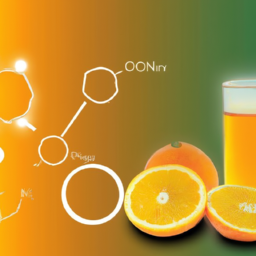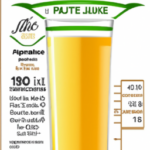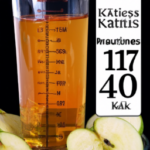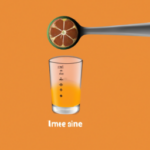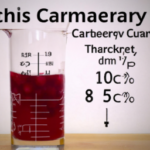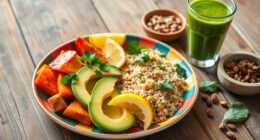As a nutritionist, I often compare our bodies to engines. Just as an engine needs the right fuel to run smoothly, our bodies require the proper nutrients to function at their best.
One nutrient that plays a crucial role in our health is potassium. Potassium helps to regulate blood pressure, support nerve function, and maintain healthy muscles. And what better way to get a dose of potassium than through a refreshing glass of orange juice?
Orange juice has long been a staple in many households, and for good reason. Not only is it a delicious and convenient way to start your day, but it also offers a host of nutritional benefits.
But how much potassium can we actually get from a glass of orange juice? In this article, we’ll dive into the science behind potassium, explore the nutritional benefits of orange juice, and take a closer look at how much potassium we can expect to find in this popular beverage.
Key Takeaways
- Orange juice is a convenient and delicious source of potassium, with an average of 450mg of potassium per 8oz serving.
- Potassium is essential for healthy blood pressure, nerve function, and muscle contraction, and helps balance fluids and electrolytes in the body.
- Deficiency of potassium can cause muscle weakness, fatigue, and cramps, and even heart palpitations and irregular heartbeat.
- A balanced diet with various potassium-rich foods, including orange juice, provides health benefits such as regulating blood pressure levels, improving immune function, and reducing the risk of chronic diseases.
The Importance of Potassium in Your Diet
You gotta make sure you’re getting enough potassium in your diet. It’s like the MVP of electrolytes, keeping your muscles and heart healthy and strong.
Potassium is an essential mineral that plays a crucial role in maintaining healthy blood pressure, nerve function, and muscle contraction. It also helps balance the body’s fluids and electrolytes, which is why it’s important to consume enough potassium-rich foods.
Potassium-rich foods include bananas, sweet potatoes, spinach, avocados, and of course, orange juice. If you’re not getting enough potassium in your diet, you may experience symptoms of potassium deficiency such as muscle weakness, fatigue, and muscle cramps. Incorporating potassium-rich foods into your diet can help prevent these symptoms and maintain overall health.
With that said, let’s delve deeper into how potassium helps maintain healthy blood pressure.
How Potassium Helps Maintain Healthy Blood Pressure
Maintaining healthy blood pressure is like keeping a steady stream flowing through a river, and potassium helps keep that flow steady.
Potassium is an essential mineral that plays a crucial role in regulating blood pressure levels in the body. This mineral works by balancing the effects of sodium, which can cause blood pressure to rise. By increasing potassium intake, you can help your body get rid of excess sodium, which can ultimately lead to lower blood pressure levels.
Potassium supplements are one way to increase your intake of this essential mineral, but lifestyle changes can also be effective in managing blood pressure. Eating a diet rich in fruits and vegetables, exercising regularly, and reducing salt intake are just a few lifestyle changes that can help maintain healthy blood pressure levels.
The benefits of these changes extend beyond just blood pressure management, as they can also improve overall heart health and reduce the risk of other health complications.
As we move on to the next section about potassium’s role in nerve function and muscle control, it’s important to note that maintaining healthy blood pressure levels is just one of the many benefits of this essential mineral.
Potassium’s Role in Nerve Function and Muscle Control
Feeling tired and weak? Potassium is crucial for proper nerve function and muscle control, which can help improve your overall physical performance and energy levels. As a vegan, it’s important to include potassium-rich foods in your diet, such as sweet potatoes, spinach, and avocado. These foods not only provide potassium, but also other important nutrients that are essential for your health.
Potassium deficiency can have negative effects on the body, including muscle weakness, cramps, and fatigue. It can also lead to high blood pressure and increase the risk of stroke and heart disease. Therefore, it’s important to make sure you’re getting enough potassium in your diet. By incorporating potassium-rich foods into your meals, you can improve your nerve function and muscle control, and reduce the risk of potassium deficiency-related health issues.
In addition to its role in nerve function and muscle control, potassium also has other nutritional benefits. One such benefit is found in orange juice, which is a great source of potassium. So let’s dive into the nutritional benefits of orange juice.
Nutritional Benefits of Orange Juice
Did you know that incorporating orange juice into your diet can provide a variety of nutritional benefits? Orange juice is high in vitamin C, which is essential for maintaining a healthy immune system. It also contains folate, potassium, and thiamine.
Potassium is a crucial mineral that helps regulate blood pressure, supports nerve function, and muscle control. Drinking orange juice can help you meet your daily potassium intake requirement. If you’re looking for an alternative to orange juice, there are other fruit juices that are high in potassium, such as tomato, prune, and apricot juice. However, orange juice has been shown to have additional benefits, such as aiding in digestion.
The high acidity levels in orange juice can help stimulate digestive enzymes and help break down food in the stomach. So, next time you’re looking for a refreshing beverage, consider reaching for a glass of orange juice.
As we dive further into the topic of potassium levels in orange juice, it’s important to note that there are several factors that can affect the amount of potassium in the juice.
Factors Affecting Potassium Levels in Orange Juice
Although some may assume that all orange juice contains the same amount of nutrients, it’s important to consider factors such as the ripeness of the fruit and the processing method used in order to understand the full nutritional value.
Here are some factors that affect the taste and acidity in orange juice, as well as the effects of processing on potassium levels:
-
Ripeness: The more ripe the fruit, the sweeter the juice may taste, but it may also have a higher acidity level, which can affect the overall taste. Additionally, the ripeness of the fruit can affect the amount of potassium present in the juice.
-
Processing: Some processing methods, such as pasteurization, can cause a loss of nutrients, including potassium. However, other processing methods, such as using high-pressure processing, can help to preserve the nutrients in orange juice.
-
Packaging: The type of packaging used can also affect the nutrient content of orange juice. For example, orange juice packaged in glass bottles may have a higher nutrient content than juice packaged in plastic bottles.
-
Additives: Some orange juice products may contain additives, such as sugar or preservatives, which can affect the nutrient content of the juice.
Understanding these factors can help consumers make informed decisions about the orange juice they consume.
Speaking of which, it’s important to note that potassium is an essential nutrient for adults.
Recommended Daily Intake of Potassium for Adults
It’s crucial for adults to meet their daily potassium needs to maintain a healthy and balanced diet, which can have a positive impact on their overall well-being.
The recommended daily intake of potassium for adults is approximately 2,500 to 3,000 milligrams. Consuming potassium-rich foods, such as bananas, sweet potatoes, spinach, and avocados, can help individuals meet their daily potassium needs.
Potassium deficiency can lead to a variety of symptoms, including muscle weakness, fatigue, and cramping. In severe cases, it can even cause heart palpitations and irregular heartbeat. Therefore, it’s important to make sure we’re getting enough potassium in our diets.
So, how much potassium is in fresh orange juice? Let’s find out in the next section.
How Much Potassium is in Fresh Orange Juice
Based on the previous subtopic about recommended daily intake of potassium for adults, I was curious about how much potassium is in one of my favorite beverages: orange juice. I love the sweet and tangy taste of fresh orange juice, but I never really thought about its nutritional value. So, I did some research to find out.
It turns out that the amount of potassium in orange juice can vary depending on the processing and the variety of orange used. On average, an 8-ounce serving of fresh orange juice contains about 450 milligrams of potassium. However, if the juice is processed and has added sugar, the potassium content may be lower.
Additionally, some orange varieties, such as Valencia oranges, tend to have higher potassium levels compared to other types of oranges. Knowing the amount of potassium in orange juice can be helpful for individuals who are trying to meet their daily potassium requirements.
Other Sources of Potassium in Your Diet
Don’t miss out on the benefits of a balanced diet that includes various foods rich in this essential mineral! While orange juice is a great source of potassium, there are many other foods that are also high in this essential mineral. Some examples include bananas, sweet potatoes, spinach, avocados, and yogurt. Incorporating these foods into your diet can help you meet your daily potassium needs, which can contribute to healthy blood pressure, proper muscle and nerve function, and overall heart health.
To help you understand the potassium content of various foods, here is a table that compares the potassium content of some common foods:
| Food | Potassium content (mg) |
|---|---|
| Banana | 400 |
| Sweet potato | 450 |
| Spinach | 800 |
| Avocado | 500 |
| Yogurt (plain, low-fat) | 530 |
While it’s important to get enough potassium through your diet, some people may consider taking potassium supplements. However, it’s important to talk to your healthcare provider before taking these supplements, as they can interact with certain medications and may cause side effects like stomach pain, nausea, and diarrhea. Additionally, if you have kidney problems or are on a potassium-restricted diet, taking supplements could be dangerous. It’s always best to get your nutrients through a balanced diet rather than relying on supplements.
Incorporating a variety of potassium-rich foods into your diet can have many health benefits, including maintaining healthy blood pressure and heart health. Speaking of heart health, let’s take a closer look at the health benefits of drinking orange juice.
Health Benefits of Drinking Orange Juice
Drinking orange juice can provide a plethora of health benefits, such as improving immune function and reducing the risk of chronic diseases. Oranges come in various varieties, such as Valencia, Navel, and Blood.
These varieties differ in taste, size, and nutritional value. However, all of them are good sources of vitamin C, folate, and potassium. In fact, a 240-mL serving of orange juice can provide around 12% of the daily recommended intake of potassium.
Apart from being a good source of potassium, orange juice also contains antioxidants that can protect the body against oxidative stress and inflammation. These antioxidants include flavonoids, carotenoids, and ascorbic acid.
Some studies even suggest that drinking orange juice can lower the risk of heart disease, stroke, and certain types of cancer. However, it’s important to note that orange juice also contains natural sugar and is acidic, which can be problematic for people with diabetes or gastrointestinal problems.
As with any food or drink, moderation is key to reap the health benefits of orange juice.
Frequently Asked Questions
What are the side effects of consuming too much potassium?
I’ve researched the potential side effects of consuming too much potassium, which can include muscle weakness, heart palpitations, and even cardiac arrest. Balancing potassium intake is important to avoid potassium toxicity.
Can orange juice be substituted for potassium supplements?
I was curious about substituting orange juice for potassium supplements. While orange juice benefits overall health, it’s not a reliable source of potassium. Alternative sources of potassium include bananas, sweet potatoes, and spinach.
How can I increase my potassium intake if I don’t like orange juice?
If I don’t like orange juice, I can increase my potassium intake by eating foods like bananas, spinach, sweet potatoes, and avocados. These foods have high potassium content, and can be incorporated into my daily diet for a healthy lifestyle.
What is the difference in potassium levels between fresh and store-bought orange juice?
As the saying goes, you are what you eat. Fresh orange juice has more potassium than store-bought. Despite lower levels compared to other beverages, it’s still a good source of this essential nutrient.
Can orange juice help lower high potassium levels in the body?
I’m not sure if orange juice can help lower high potassium levels in the body. However, it’s important to consume potassium rich foods in moderation. Alternative juices with lower potassium levels may be more effective.
Conclusion
Well, well, well. Who knew that orange juice could pack such a punch when it comes to potassium? As someone who hasn’t been a big fan of bananas, I’m thrilled to learn that one glass of fresh orange juice can provide up to 12% of my daily recommended intake of this essential mineral.
And let’s not forget about the other nutritional benefits of orange juice, like its high vitamin C content and ability to lower cholesterol levels. But the irony here is that often, when we think of potassium-rich foods, we automatically think of bananas.
But as this article’s shown, there are plenty of other sources of this important mineral out there, and orange juice is just one of them. So next time you’re looking to up your potassium intake, don’t overlook this delicious and refreshing drink.
Ilana has been a vegan for over 10 years. She originally made the switch for health reasons, but soon found herself becoming more and more passionate about the ethical and environmental implications of a vegan lifestyle. Ilana is the author of The Graceful Kitchen, a blog all about veganism. She loves to cook up delicious and nutritious vegan meals, and share her recipes with others who are interested in leading a cruelty-free life. Ilana is also a strong advocate for using whole foods as the foundation of a healthy diet, and believes that going vegan is one of the best ways to achieve this.
